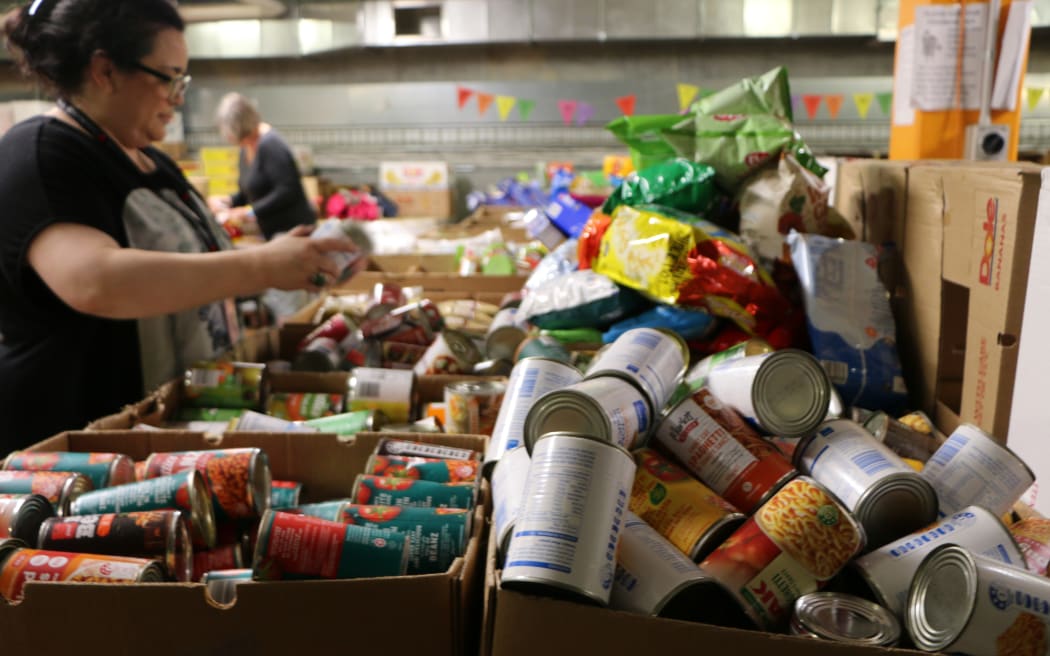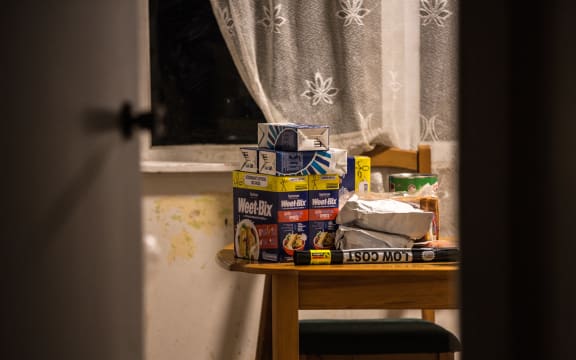
File photo. Food parcels being packed at Christchurch City Mission last year. Photo: RNZ / Niva Chittock
Anti-poverty campaigners are hopeful of tangible support for New Zealand's vulnerable in the so-called "no frills" Budget.
With the major announcement on cyclone recovery out of the way, the focus will be on what the government has up its sleeve to ease the cost of living.
The number of people accessing the Christchurch City Mission's services had increased, and city missioner Corinne Haines said the level at which people struggled had changed.
"Once upon a time, years ago, it might be a single male, but now it's families, and it's families on incomes, with jobs, because they're struggling to keep up with the increase in costs across everything," she said.
See RNZ's full coverage of the 2023 Budget here
Finance Minister Grant Robertson knows New Zealanders are looking to him for answers on the cost of living.
"It's been a challenging Budget to put together, but it is one where I think that we've got the balance right," Robertson said on Wednesday.
Despite an Inland Revenue report showing the country's wealthiest are paying tax at a much lower rate than the rest of New Zealanders, the government has ruled out major tax changes - such as a capital gains tax, a wealth tax, or a tax cut - in the Budget.
But one option that could still be on the table is a tweak to Working for Families.
A review into the structure and design of the tax credit scheme has been with the Minister for Social Development for months.
When asked on Monday whether any decisions had been made on the review, the prime minister pivoted.
"I know you're trying to lead me into talking about what is or isn't in the Budget, and you're just going to have to wait a couple more days," he said.
Child Poverty Action Group economic spokeswoman Susan St John said Working for Families was inherently discriminatory - but that discrimination could be removed.
"The families who are not on a benefit, but in low paid work, have a substantial problem with Working for Families debt, because the payment that they get - that the caregiver gets - reduces once the household income exceeds $42,700, which is a very low household income.
"And it's easy to go over that and not realise that you're then not entitled to as much Working for Families as you were before, and then you incur this debt, which will have to be repaid."
She said raising the entitlement thresholds would be a good start.
"The threshold - that $42,700, which has been fixed for many years - we've done the calculations to show if it was properly indexed it would be at least $52,700 by now. That would make a substantial difference."
St John also suggests folding the In-work Tax Credit into the Family Tax Credit, which is paid regardless of income source. It would cost $500m a year, but she said it would do more to lift children out of poverty.
"We've got the poorest families, the worst-off children denied the benefit of the In-work Tax Credit, which is worth $72.50 for a one-to-three child family, and another $15 per child for larger families. That's a substantial amount to cut out of an already far too low budget," she said.

Food banks report more families, including those with a person working, are finding it hard to make ends meet to provide the basics Photo: RNZ / Cole Eastham-Farrelly
Infometrics principal economist Brad Olsen believes it's an area ripe for the picking in the Budget.
"There has been a lot of work done on it. And it is, in a sense, an area that was already expected at some point in the government's lifecycle to be focused on, given the review that's gone into it.
"The challenge, I think, is looking at how that affects a number of other, or doesn't affect, a number of other New Zealanders."
Olsen warned there was still a risk putting more money in people's hands could make inflation worse.
He believed any support would have to be tightly targeted - unlike last year's cost of living payment.
"Any time that you are substituting or providing for additional money inclined, or in direct form, to households, you are effectively starting to neuter some of the effects that are happening in the wider economy to try and reduce consumption.
"That's why effectively anything that government does risks stoking inflation further, which is why that very temporary and targeted support, rather than across the board large spending, which would be more inflationary, is likely where the government's going to land."
But Corinne Haines said anything that allowed people not to have to choose between their rent, or their electricity or food, would be welcome.
"What you really want to do is give people that dignity to be able to choose what they spend their money on, and to make good decisions, and to get them to be in charge of their own daily costs," she said.
Whether the government agrees, the nation will find out at 2pm.








